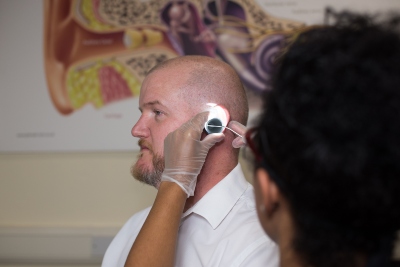In September 2020, Government minister Edward Argar confirmed that ear wax removal would no longer be available on the NHS as a core GP service.
When Covid-19 struck, many GP surgeries in the Wrexham area removed their provision of NHS ear wax removal. They have yet to reinstate it. As ear irrigation is an enhanced service, it is up to local clinical commissioning groups to commission it or not.
Those suffering from underlying hearing loss may be eligible to be referred to NHS audiology services. However, the general recommendation is that people having issues with ear wax removal should now “treat it themselves”.
How Do You Best Clean Your Ears?
The usual answer is you don’t. Ear wax is a natural, sterile bodily fluid designed to prevent dust and debris from getting to the eardrum. It sits in the tiny hairs at the entrance to the ear canal and moves out of the ear gradually from the movement of the jaw through talking and chewing. Therefore, there usually is no need to clean the ear canal itself. A simple wipe-away while bathing will suffice. That means no cotton buds, at-home kits or HOPI ear candles. These can be dangerous and lead to trauma to the eardrum.
You may be tempted to browse the internet to try out an at-home wax removal method if your ears get excessively blocked. Your GP will most frequently recommend olive oil, hydrogen peroxide, or sodium bicarbonate drops to clear a blockage. Drops, however, are generally only a short-term fix.
Unfortunately, if you have suffered the symptoms of a complete blockage, you are unlikely to clear the ears entirely with ear drops alone. The wax often rebuilds, leading to another blockage, meaning professional removal with a procedure is inevitable in the future.

“What do I do now if my ears block with wax?”
The reduction of local services has left many asking, “What do I do now if my ears block with wax?”. It will now be a postcode lottery regarding what treatment is available. Many will find in the future that going private is their only treatment option for troublesome blockages.
Many GPs now openly advise patients to seek private professional treatment immediately. NHS waiting times for those still offering services locally stand at months rather than weeks.
That said, microsuction, the treatment most used privately, is the safest method. It comes with less risk of ear infection or eardrum perforation than the typical water methods that used to be available on the NHS. It could be argued as a worthwhile investment.
Olivia Austin BSc
Registered Hearing Aid Audiologist

Visit Love Wrexham for more news stories.

